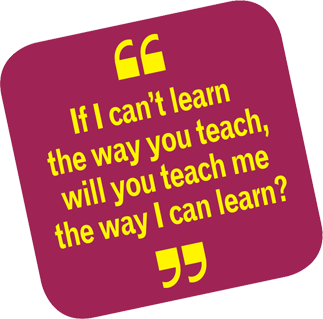
http://www.freepressjournal.in/Featured-Blog/dyslexia-has-nothing-to-do-with-intelligence/900190
Kate Currawalla: Dyslexia has
nothing to do with intelligence.
And yet the most obvious manifestation
is that the child struggles
with just very basic learning.
It’s something that a child experiences
right from the beginning.
While the child is able to do most
things, he/she struggles with
reading, writing, spelling,
maths, classroom activities –
the basic learning. So here
you have kids who are able to
do most things and may even
show a talent for it, so you
know that they are normal.
It’s not that they are lacking
in intelligence or IQ, but at the
same are not able to do certain
things.
Q: How did you find about
Dyslexia?
Kate Currawalla: I’ll just refer
to a case of my elder son Moran.
From a very young age, he was
very fond of Lego, of constructing
things. From the beginning, he
would just make a beeline – even
from the age of two. So we had
very high expectations from him.
But as he grew older, when it
came to reading, he simply
couldn’t read. Within a week of
school starting, his teacher called
me, and said Moran is just not
able to read. But fortunately she
was a wonderful teacher who
took extra efforts to teach him.
Just then we also discovered that
some of his cousins in different
parts of the world had the same
problem. This made it easier for
us to understand why Moran was
going through this. Later, I found
a book on teaching children with
reading disabilities at Smokers
Corner. I started teaching him
from that. So it was good luck all
around, a good teacher who was
patient, a good school which was
very supportive.
Q: How common is Dyslexia in
India?
Kate Currawalla: Seven percent
of population has Dyslexia, that’s
a very, very high number.
Q: You are the Founder
President of Maharashtra
Dyslexia Association (MDA).
How has MDA addressed the
issue?
Kate Currawalla: In 1995,
around the time we started, a
group of parents had already
approached the Maharashtra
Education Board and the SSC
Board who encompassed this
issue. We were fortunate to have
certain people who were in positions
of power and understood
the problem. This gave us a little
bit push, which earlier was lacking.
Finally, the Education
Department and the SSC Board
accepted it. At the beginning we
saw hysterical parents who only
tried to cover-up for their own
kids. But gradually, I think with a
lot of dialogue, seminars, and
press articles they become more
aware and accepting. While it has
been a long journey, it has definitely
been a fruitful one.
Q: Are Doctors now able to
diagnose Dyslexia? How does
MDA handle it?
Kate Currawalla: Today some
pediatricians have established
clinics but their diagnosis are
based on one person who has
been trained either as a pediatrician
or as a physiologist. And it
rewards on that one person’s lectures,
knowledge base or preferences.
Whereas at MDA, we are
trying to cater to the needs of the
child. We don’t say, we have
remedial and diagnostic services.
We say, we have family services.
It’s important for us to work with
the parents in order to work
with the child. Parents need to
understand and acknowledge
their journey
as well. This empowers
them to understand exactly
what the child’s difficulties
are, what the child is capable
of, what kind of support the
child needs.
Q: How can schools support
Dyslexic students?
Kate Currawalla: There are levels
of supports that the child
needs institutionally. Firstly, the
school needs to accept that there
are kids in every class who will
struggle with basic reading and
writing activities. Those kids
need to be identified and helped.
It is up to the school to decide on
whether to give that extra help in
school or advices the parents to
seek it outside. Even by just identifying
the children they have
made a start.
The next level is to understand
that every child is not going to
score of 90% and 100%. Very
often the child who is failing in
class maybe very good at play or
even if he doesn’t, he would benefit
in terms of confidence and
self-esteem. Rejection itself plays
a very powerful part in this
child’s development. And
whether this kid is going to be
able to overcome his difficulties
or he is going to just go under is
the last level.
Q:What advice would
you give to parents whose
child is diagnosed with
Dyslexia?
Kate Currawalla: I would say
be patient, be sensitive and be a
parent first. I think the biggest
mistake I made was trying to
teach my children, when I didn’t
know anything about teaching.
And I think we lost out a little bit
then. But my children tell me that
the biggest thing that their father
and I did right was encourage
them to do other things beyond
academics. There is always this
temptation that if a child is not
performing well in school he
should not be allowed to do
extracurricular activities, and
focus on tuition after tuition.
This doesn’t work. Kids need to
develop other activity, and
other interests. They need a
break from the things that they




